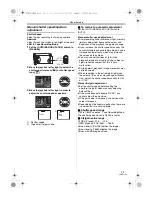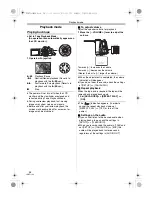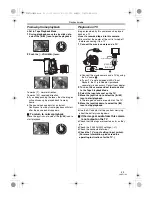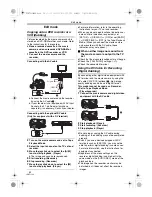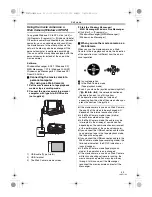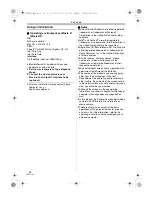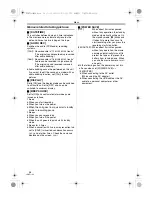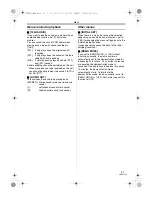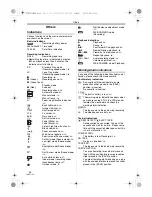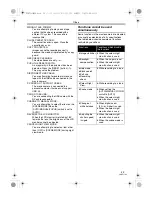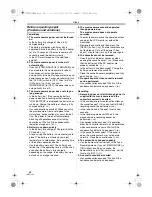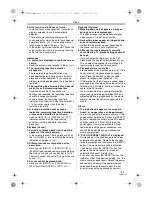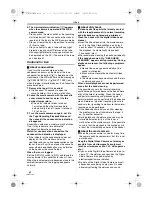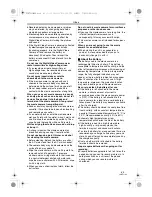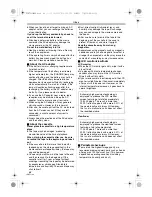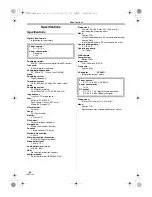
Others
43
LSQT1134
≥
Recorded data may be damaged, or pictures
may be distorted, by strong magnetic fields
created by speakers or large motors.
≥
Electromagnetic wave radiation generated by
microprocessors may adversely affect the
Digital Video Camera, disturbing the pictures
and sound.
≥
If the Digital Video Camera is adversely affected
by electromagnetic equipment and stops
functioning properly, turn the Digital Video
Camera off and remove the battery or
disconnect AC adaptor. Then reinsert the
battery or reconnect AC adaptor and turn the
camera on.
Do not use the Digital Video Camera near
radio transmitters or high-voltage lines.
≥
If you record near radio transmitters or
high-voltage lines, the recorded pictures and
sound may be adversely affected.
Do not spray insecticides or volatile
chemicals onto the movie camera.
≥
If the movie camera is sprayed with such
chemicals, the camera body may become
deformed and the surface finish may peel off.
≥
Do not keep rubber or plastic products in
contact with the movie camera for a long time.
When you use your movie camera in a sandy
or dusty place such as on a beach, do not let
sand or fine dust get into the body and
terminals of the movie camera. Also, protect
the movie camera from getting wet.
≥
Sand or dust may damage the movie camera or
cassette. (Care should be taken when inserting
and removing a cassette.)
≥
If sea water splashes onto the movie camera,
wet a soft cloth with tap water, wring it well, and
use it to wipe the camera body carefully. Then,
wipe it again thoroughly with a soft dry cloth.
While carrying the movie camera, do not drop
or bump it.
≥
A strong impact on the movie camera may
break its housing, causing it to malfunction.
Do not use benzine, paint thinner or alcohol
for cleaning the movie camera.
≥
Before cleaning, detach the battery or pull out
the AC mains lead from the AC mains socket.
≥
The camera body may be discoloured and the
surface finish may peel off.
≥
Wipe the movie camera with a soft dry cloth to
remove dust and fingerprints. To remove
stubborn stains, wring well a cloth that is soaked
in a neutral detergent diluted with water and
wipe the movie camera with it. Afterwards, wipe
it with a dry cloth.
≥
When you use a chemical dust cloth, follow the
instructions.
Do not use this movie camera for surveillance
purposes or other business use.
≥
If you use the movie camera for a long time, the
internal temperature increases and,
consequently, this may cause malfunction.
≥
This movie camera is not intended for business
use.
When you are not going to use the movie
camera for an extended time.
≥
When storing the unit in a cupboard or a
cabinet, it is recommended that you put a
desiccant (silica gel) in with it.
ª
About the battery
The battery used in the movie camera is a
rechargeable lithium ion battery. This battery is
susceptible to temperature and humidity, and the
effect of temperature increases with increasing or
decreasing temperature. In the low temperature
range, the fully charged indication may not
appear, or the low battery indication may appear
about 5 minutes after the start of use. At high
temperature, moreover, the protection function
may work, disabling use of the movie camera.
Be sure to detach the battery after use.
≥
If the battery is left attached to the movie
camera, a minute amount of current is
consumed even when the movie camera power
is [OFF]. If the battery is left attached to the
movie camera for a long time, over-discharge
takes place. The battery may become unusable
after it is charged.
≥
The battery should be stored in a cool place free
from humidity, with as constant temperature as
possible. (Recommended temperature: 15
o
C to
25
o
C, Recommended humidity: 40% to 60%)
≥
Extremely high temperatures or low
temperatures will shorten the life of the battery.
≥
If the battery is kept in a high-temperature,
high-humidity, or oily-smoky places, the
terminals may rust and cause malfunctions.
≥
To store the battery for a long period of time, we
recommend you charge it once every year and
store it again after you have completely used up
the charged capacity.
≥
Dust and other matter attached to the battery
terminals should be removed.
Prepare spare batteries when going out for
recording.
≥
Prepare batteries appropriate to 3 to 4 times the
period during you want to record pictures in. In
cold places such as a ski resort, the period
during which you can record pictures is
shortened.
LSQT1134ENG.book 43 ページ 2007年1月17日 水曜日 午前11時49分

